faith leaders
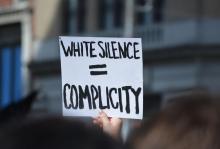
"Our faith is rooted in the incarnation, life, death, and resurrection of Jesus Christ, and his teachings claim authority in life and in death.
We reject as false doctrine any other claim on our lives—whether contrived of state or reason—that violates Jesus’ ethic of the equal and inestimable dignity of all people, each created in the very image of God and as such equally created with the divine call and capacity to sustain, protect, and serve the world."
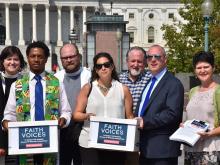
“As a leader in my religious community, I am strongly opposed to any effort to repeal or weaken current law that protects houses of worship from becoming centers of partisan politics,” reads the letter faith leaders who support church-state separation delivered to Congress on Wednesday.
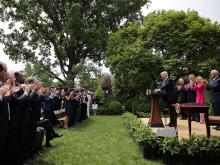
“America is a deeply religious country because religious freedom and tolerance of divergent religious views thrive. President Trump’s efforts to promote religious freedom are thinly-veiled efforts to unleash his conservative religious base into the political arena while also using religion to discriminate. It’s a dual dose of pandering to a base and denying reproductive care.”

The two major streams of Christian engagement on war are pacifism and just war theory, which comes out of Catholic social teaching. The pacifist response to Syria strikes is clearly opposed. As for the just war analysis, it takes a little explaining, but reaches the same conclusion.

The Rev. Leah Daughtry stood in front of fellow black Christian leaders and told them they will need to work harder for social justice.
“If you’ve been feeding them, now clothe them,” said the Pentecostal pastor and 2016 CEO of the Democratic National Convention Committee at a conference last week. “If you’ve been clothing them, now console them. If you’ve been at a march, now lead the march. If you’ve been at a rally, now organize the rally.”
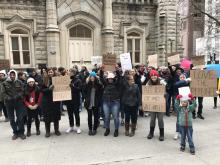
A survey released last week by the Pew Research Center suggested a very different view of the presidential actions, especially among white Protestant Christians.
There was strong support among white evangelical Protestants, with more than three-quarters (76 percent) saying they approve of the policies outlined in Trump’s order. Among white mainline Protestants, 50 percent approved.
Many Christians now are asking the question Helena Leffingwell of Arlington, Texas – not a pastor or ministry leader, just a regular member of Gateway Church, a nondenominational megachurch – put into words: “How can we see things so differently?”
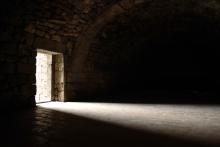
“Are we going to have to worry about ICE agents swooping down on our clients on distribution day?” he said. “What if my congregation chose to offer sanctuary to an immigrant facing deportation? Would we have to worry about immigration officers and sheriff’s deputies kicking down our front door?”
Bishop Mark Beckwith, who heads the Episcopal Diocese of Newark in New Jersey, says at least 10 of the 100 congregations in his diocese have parishioners who are affected by the new policies. He described a heightened sense of urgency as his diocese investigates what its collective response should be.
“What is so upsetting about this is we don’t know what a safe space is,” he said, citing uncertainty about whether the traditional status of churches as sanctuaries will be respected. “We need to move as fast as these executive orders are moving. That’s the challenge. We are grounded in our biblical faith and we need to respond.”
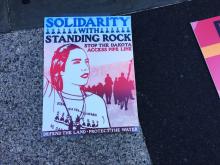
Dec. 4 was a beautiful reminder, in the long struggle for justice, that, no matter how long we wait, God hears our cry. And love and justice will win.
A few weeks ago, Chief Arvol Looking Horse issued an invitation to clergy and faith leaders to stand in solidarity with the people of Standing Rock. He said he was hoping maybe 100 would respond. But I joined thousands, in a procession of faith leaders, to gather around the sacred fire at the Oceti Sakowin Camp at Standing Rock.
I knew something special was happening here.

White House officials have joined faith leaders in endorsing an end to payday lending abuses that often charge triple-digit interest rates. Valerie Jarrett, Cecilia Munoz, and Jeff Zients, all top aides to President Obama, met April 14 with religious leaders from across the country who described “heart-wrenching stories” of congregants whose lives had been ravaged by payday loans.
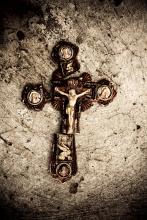
SINCE WAR BROKE out in the Central African Republic in March 2013, the international community has referred to it as a “religious conflict.” When the media cover the violence at all, they usually frame it as a story of Muslims against Christians. However, to call this conflict a war of religion is simplistic at best and a smokescreen for the real causes at worst.
That is the message that Central African Republic (CAR) faith leaders—Catholic, evangelical, and Muslim—have worked tirelessly to spread, at great personal cost. Imam Omar Kobine Layama, president of the Central African Islamic Community, Catholic Archbishop Dieudonné Nzapalainga of Bangui, and Rev. Nicolas Guérékoyame-Gbangou, president of the Evangelical Alliance of the Central African Republic, have been at the forefront of their country’s peace and reconciliation movement.
During a November 2014 interview in Washington, D.C., Archbishop Nzapalainga adamantly refuted the “religious war” narrative.
“Our role is to continually remind our religious believers ... that those people who want to kill people or rape people ... are in contradiction with their faith,” he told Sojourners. “We, for example, have never been telling our believers that they should go out and kill Muslims, and the imam has never been telling his followers that they should go out and kill Christians.”
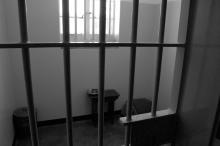
I believe that Nelson Mandela was the greatest political leader of the 20th century — because of his 27 years of spiritual formation in prison. Visiting Mandela’s jail cell on Robben Island was the most emotional moment of my visit to South Africa this past summer. How could such a small place so change the world?
I found this quote by Mandela when I visited the Apartheid Museum in Johannesburg on my last day in South Africa. It’s about how “the cell” drove him much deeper into his interior life. I think his words are a good reflection for us as we choose our elected leaders next week:
“The cell is an ideal place to know yourself. People tend to measure themselves by external accomplishments, but jail allows a person to focus on internal ones, such as honesty, sincerity, simplicity, humility, generosity and an absence of variety. You learn to look into yourself.”
Let’s reflect on that quote, both personally as leaders in the faith, and politically as we confront a very depressing election.
Know yourself. That is such different advice from what our candidates and other leaders get from their advisors and pollsters and boards of directors who want them to know their audience, their constituency, their potential voters or consumers — but not so much themselves. Leaders are often being told to “be who they need you to be,” and seldom are they invited to go deeper into themselves.
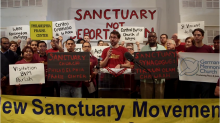
BREAKING NEWS:
There is a nonviolent uprising around immigration happening in Philadelphia and a dozen other U.S. cities. Philadelphia faith leaders announced that they will welcome immigrant families even if it is against the law. They are building a movement of "sanctuary congregations" and have dreams that the U.S. will one day be a sanctuary nation.
We join them in insisting that we must obey the laws of God over the laws of our government — and that means "welcoming the foreigner as if they were our own flesh and blood." (Exodus 22:21, Lev.19:34, etc., etc.).
Jesus says that when we welcome the stranger we welcome him. When God asks: "When I was a stranger did you welcome me?" (Mt. 25) we are not going to say: "Sorry God, Congress wouldn't let us."
We know that sometimes divine obedience can mean civil disobedience.
As St. Augustine once said: "An unjust law is no law at all."
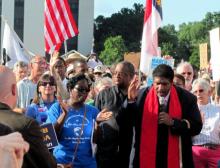
Faith leaders who sit to the left in American politics say they won’t let the religious right claim the moral mantle in the elections of 2014.
On Sept. 9, they announced a new campaign to boost voter registration and encourage voters, particularly in poor and immigrant communities, to go to the polls.
On a conference call to reporters, Ted Strickland of the Center for American Progress Action Fund, an ordained Methodist minister and former Democratic governor of Ohio, said he and others leaders will go door to door and church to church to press their message: that people of faith should pursue a public policy that is fair and just.
The Rev. William Barber, leader of North Carolina’s “Moral Monday” movement, which has long protested acts of the state’s conservative legislature, quoted Isaiah 10: “Woe to those who make unjust laws.”

Religious leaders urged President Obama and Congress to provide funding for legal assistance to unaccompanied migrant children who are in U.S. custody after fleeing violence, murder, and extortion abroad.
Multiple speakers, including United Methodist Bishop Minerva Carcano and the Rev. David Vasquez, spokesman for the Lutheran Immigration and Refugee Service, took part in a national teleconference Thursday. They then sent a petition signed by more than 3,800 people to Congress.

"The Clean Power Plan is a great step forward for our country in taking climate change seriously. It’s clear that President Obama cares about the legacy he leaves to today and into future generations. While there is a lot more that can and should be done by this Administration and by Congress, President Obama deserves our appreciation for embracing the common good and taking such a big step to preserve the earth for our grandchildren’s grandchildren."

We’re trying something new at Sojourners, and I have to say, I’m excited about it. Like all new things, it is a work in progress, but even in its early stages, I’d like to share it with you and to ask for your help.
Over the course of any given year, I work with hundreds of leaders across the globe on issues affecting poverty, immigration, racial justice, women and girls, and the environment. They are academics, activists, nonprofit leaders, entrepreneurs, local pastors, and denominational leaders — but all of them care about changing the world through faith and justice. And over the course of the year, Sojourners' staff members meet hundreds more as they travel. Their work inspires us.
But here is the problem: Hundreds and hundreds of amazing people are doing fantastic work, but many of them don’t know each other. So, we started talking with each other, our board and the leaders we were working with about building a gathering focused on inspiration, collaboration, and relationships. We are pleased to announce the first of what we hope will be many of these gatherings: The Summit: World Change Through Faith and Justice.
From June 18-21, at Georgetown University, 300 leaders will gather for this inaugural event. This is where we need your help ...
We want you to help us find 50 of them.


Christianity consists of thousands of tribes, cliques, and communities — each with different theologies, traditions, and doctrinal beliefs. Within a Westernized society obsessed with celebrity, entertainment, popularity, conflict, and money, it can be easy for Christian groups and communities to clash with each other.
For the modern church, much of its recent legacy has involved conflict, division, and controversy. Christians have developed a love-hate relationship with theologians, pastors, and church leaders — and it’s dividing the church.
Many Christians see their faith journeys as series of either/or situations and decisions — this is bad. Because as much as we want things to be clear, concise, and black-and-white, reality is complex and messy.
Pride, greed, hatred, bitterness, fear, and ignorance often cause Christians to promote distrust instead of unity — but what if Christians were more patient, graceful, and forgiving of each other?

It seems like there’s nothing but bad news all around us. Congress can’t get anything done, the Middle East is in turmoil, and climate change is making natural disasters worse around the world. But a couple of weeks ago, I went to an event in Washington, D.C., hosted by the National Campaign to Prevent Teen and Unplanned Pregnancies that celebrated a major accomplishment. The teen birth rate and pregnancy rate are both down — and not just by a little bit.
The teen birth rate has plummeted by 52 percent since 1991, while the teen pregnancy rate has fallen by 42 percent. Fewer teen pregnancies mean fewer abortions, less financial strain on families, and more children being born into families that are ready to have a child.
This news came as a surprise to me, as it did to many. Seventy-four percent of adults incorrectly believe the teen pregnancy rate has increased or stayed the same. Fewer teens have gotten pregnant do to a combination of waiting to have sex until later and being more educated about the proper way to use contraception. This news doesn’t fit the current narrative that millennials and young people don’t take personal responsibility for their lives and choices.
This success is yet another example of what government, the private sector and faith community, and families can accomplish when they work together.
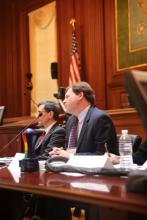
The Environmental Protection Agency held listening sessions Thursday to hear from the public about a forthcoming rule about carbon emissions from existing power plants. More than 20 faith leaders spoke on behalf of those Jesus called “the least of these.” In addition to such faith leaders as Rev. Dottie Yunger and Interfaith Power & Light’s Joelle Novey, other parties, from pro-coal Sen. Mitch McConnell, R-Ky., and coal lobbyist Mike Carey to the Sierra Club’s Leslie Fields and League of Conservation Voters’ Gene Karpinski, were on hand to testify. Those testifying had three minutes apiece to voice their views on what the new rule on emissions should look like.
Prior to the testimonies, more than 20 faith leaders assembled outside of the EPA to pray that God’s creation would be restored. Organized by Creation Justice Ministries and Greater Washington Interfaith Power and Light, the vigil featured songs of hallelujah and peace. Novey read a Jewish prayer for travelers, asking God to lead us into safety.
After the worship service, the faith leaders joined a diverse audience to testify to the EPA about the importance of battling climate change. I saw five faith leaders speak, reminding the agency that they not only have a technocratic responsibility to create a stringent rule limiting carbon emissions, but also a moral responsibility to do so.